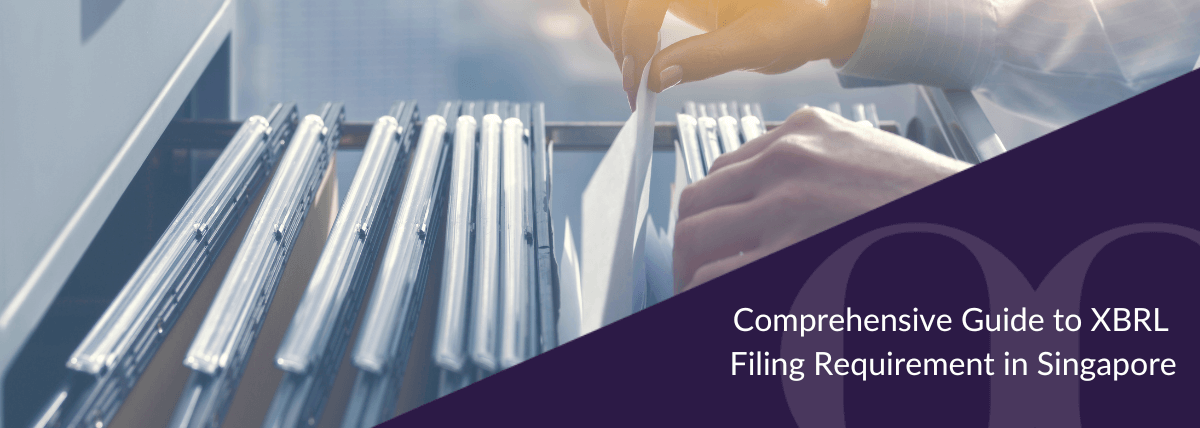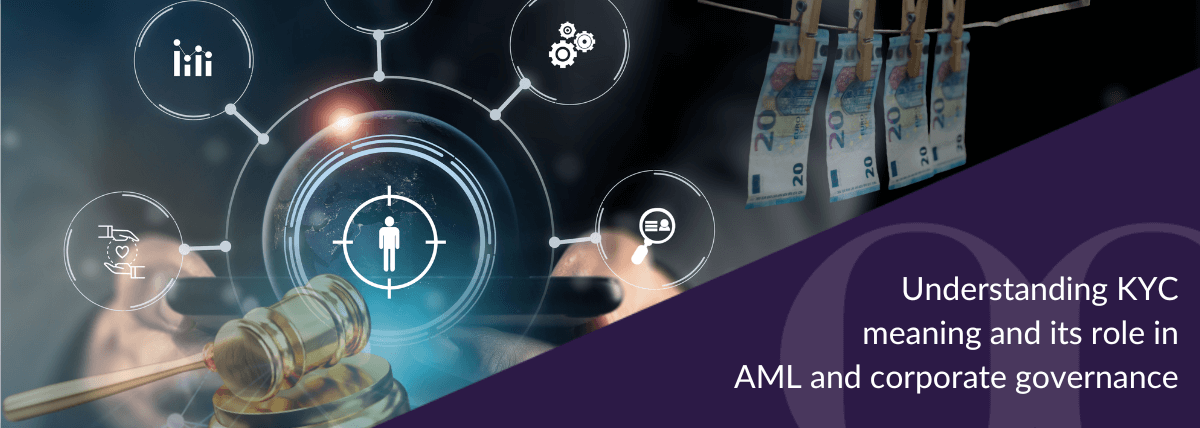In the heart of Southeast Asia, Singapore’s political stability, strategic location close to booming markets, favourable tax incentives, and a skilled workforce make it an attractive destination for multinational corporations and startups alike.
In this dynamic economic landscape, Know Your Customer (KYC) and Anti-Money Laundering (AML) frameworks are critical safeguards, ensuring the seamless operation and integrity of businesses within Singapore’s thriving economy. Beyond regulatory adherence, KYC and AML influence corporate reputation, financial health and operational sustainability. Read on to find out more about the meaning of KYC.
Understanding what KYC is in Singapore’s regulatory landscape
Singapore offers a streamlined process for the formation, registration, merger and acquisition of companies, which has inadvertently led to an increase in money laundering and illegal financing activities.
To address this, the Accounting and Corporate Regulatory Authority (ACRA) of Singapore, alongside the Financial Action Task Force (FATF), established a comprehensive set of guidelines and regulations. These include rigorous KYC regulations, which are enforced by the Monetary Authority of Singapore (MAS).
Many companies choose to work with a highly skilled company secretary who is knowledgeable about the local regulatory environment when setting up a company to ensure they are compliant.
What is KYC?
In Singapore’s financial sector, KYC practices are paramount, especially in activities such as banking and equity financing, to safeguard the financial interests of businesses, investment firms, and investors.
Regulations-mandated KYC processes include the thorough verification of customer identification before financial services can be offered. These practices help mitigate the risks of money laundering, especially in transactions of high monetary value.
With financial crime becoming more intricate, the MAS regularly updates its KYC regulations, urging companies to stay informed and compliant to avoid penalties and protect their reputation.
Importance of KYC in corporate governance
Non-compliance with KYC poses significant operational and financial risks, including the potential for a company’s operational suspension, license revocation and hefty penalties that can impact a company’s bottom line and investor confidence.
KYC compliance is vital for businesses for a range of reasons, with the most significant including:
- Risk management: Verifying customer identities and transaction details helps prevent money laundering and terrorism financing.
- Regulatory compliance: Following KYC regulations is mandatory in Singapore and is crucial for preserving a company’s reputation and integrity.
- Trust and integrity: Strong KYC practices demonstrate a commitment to ethical standards to stakeholders, thereby helping to safeguard a company’s reputation.
Experienced corporate services providers who are well-versed in administrative corporate secretarial work and corporate governance advisory services can ensure that companies meet all the above compliance requirements.
Such advisory services include:
- Gap analysis of the company’s corporate governance framework
- Crafting and reviewing policies on interested person transactions
- Sustainability practices
- Code of business conduct and ethics

Challenges in maintaining compliance due to lack of expertise
The regulatory landscape is dynamic, requiring companies to stay informed and adapt their compliance strategies accordingly. Challenges in maintaining compliance with KYC and AML include increasingly sophisticated illegal activities, and the need for specialised knowledge to monitor sudden changes in a client’s business activities and frequent changes in directorship within a short period of time.
Kevin Cho, Director of Corporate Secretarial for BoardRoom, explains more. “Lack of talent knowledge on AML measures can be a challenge, but this can be overcome through regular updates from the professionals, lawyers, and authorities, or through education and training. We can also utilise digital KYC platforms to trace the beneficiary owners hidden behind multiple layers of entities,” says Kevin.
Digital KYC platforms are increasingly gaining traction as businesses recognise the importance of streamlined identity verification processes. These platforms harness cutting-edge technologies such as artificial intelligence, biometrics and machine learning to remotely and securely verify customer identities in real time. In this aspect, KYC digital platforms help address talent shortages by optimising existing resources, automating repetitive tasks, enabling remote work, and facilitating faster onboarding and training processes.
As part of AML regulations, companies must actively monitor transactions of large values. However, few companies are equipped with the proper tracking mechanisms or are across on the latest regulatory changes.
Angelin Loh, Senior Manager, Corporate Secretarial at BoardRoom, adds, “Our team keeps up to date with regulatory changes from authorities such as MAS, Commercial Affairs Department (CAD), and the Singapore Police Force (SPF), reviewing guidelines and notices issued by these authorities to ensure compliance, which we then disseminate to our clients.”
Being aware of penalties and laws
The MAS requires financial institutions to comply with specific controls, including customer and beneficial owner identification, regular account reviews and monitoring and reporting suspicious transactions. This impacts not just companies but also directors. Directors are accountable for ensuring that their companies comply with these regulations, and failure to do so could have legal or regulatory repercussions for them as individuals.
Penalties for non-compliance include the following:
- Directors and individuals involved in money laundering offences can face:
- fines up to SGD 500,000; and
- up to 10 years in prison.
- Financial institutions failing to adhere to AML policies set by the MAS may incur:
- fines up to SGD 1 million per offence; and
- for chronic offences, an additional SGD $100,000 per day.
- Companies not complying with KYC regulations set by ACRA face significant repercussions, including:
- cancellation of ACRA registration;
- denial of access to business services; and
- financial penalties.
KYC checklist for companies
A comprehensive KYC program not only ensures regulatory compliance, there are other advantages of KYC including safeguarding the company’s reputation and financial integrity.
Here is a simplified KYC checklist outlining the essential components companies should incorporate:
- Verify the identity of clients or customers.
- Identify and document ultimate beneficial owners (UBOs).
- Conduct background checks to assess the source of funds and business intentions.
- Evaluate risk profiles based on business activities and geographic locations.
- Apply a risk-based approach for continuous monitoring.
- Schedule due diligence reviews based on risk level (annually for high-risk, biennially for others).
- Keep abreast of and comply with the latest AML/KYC regulations.
- Update compliance programs and staff training as regulations evolve.
A robust KYC framework can help companies navigate the complexities of financial regulations, upholding their reputation and ensuring the stability of their financial transactions.
“This systematic approach ensures companies are not just compliant but actively managing potential risks,” says Kevin.

The relationship between KYC and AML
KYC represents one aspect of AML – a set of measures and procedures aimed at preventing financial crimes implemented by financial institutions and other regulated entities.
These measures include:
- analysing customer transactions;
- keeping records; and
- reporting suspicions of money laundering to the relevant regulatory authorities.
“Because of the AML framework, that’s why we have KYC,” Angelin Loh explains. “Having effective KYC and AML practices helps companies to identify risks on the onset and try to mitigate risks associated with money laundering, terrorist financing and financial crimes.”
The critical role of AML governance in corporate compliance
Incorporating AML practices into corporate governance frameworks demonstrates a company’s commitment to ethical business practices and risk management. It signals to regulators, partners, investors and the public that the company adheres to the highest standards of legal compliance.
Adhering to an AML governance framework strengthens stakeholder trust, enhances corporate reputation and ensures long-term sustainability and success in the global marketplace.
The implications of non-compliance
Non-compliance with AML regulations presents substantial risks, including reputational harm that can diminish trust among customers, investors and broader stakeholders.
The monetary penalties are also severe. Any financial institution that does not adhere to the relevant AML regulations may face fines of up to SGD 1 million per offence and additional fines of SGD 100,000 for each day that the offence continues.
Recent cases of AML breaches in Singapore highlight the serious consequences of AML non-compliance:
For businesses, the message is clear: stringent AML procedures are non-negotiable.

Protect your business assets
Robust KYC and AML processes are central to comprehensive corporate governance, protecting businesses from legal, reputational and financial risks.
The complexity of corporate obligations necessitates the support of a trusted corporate secretarial service. A competent company secretary in Singapore ensures your business remains compliant with changing regulations, safeguarding your company’s integrity.
With more than 50 years of experience, BoardRoom offers comprehensive corporate secretarial and governance advisory services across Singapore and the Asia-Pacific. Our team, equipped with local, regional and global expertise, can help your company navigate compliance complexities, boosting stakeholder confidence and securing long-term success.
Our services include:
- An independent assessment of your KYC obligations to ensure that your incorporated company adheres to KYC procedures and AML checks.
- Maintenance of proper statutory registers, such as the registrable controller, to ensure transparency and compliance within your company’s corporate governance framework.
- Gap analysis of your company’s corporate governance framework.
- Annual evaluation of board activities and individual directors.
Get in touch with us today to enhance your corporate governance standards.
Contact BoardRoom for more information:
Related Business Insights
-

08 Jul 2024
Your Guide to Corporate Tax Filing in Singapore
Learn to navigate corporate tax filing in Singapore effectively and ensure timely, compliant submissions with our c …
READ MORE -

14 Jun 2024
Comprehensive Guide to XBRL Filing Requirement in Singapore
Explore the essentials of XBRL filing in Singapore, covering mandatory requirements, benefits, preparation steps, a …
READ MORE -

11 Jun 2024
Corporate governance best practices at all levels of the company
Corporate governance goes beyond compliance, shaping the fabric of an organisation. Discover the corporate governan …
READ MORE


